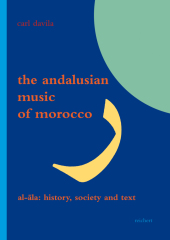 Neuerscheinungen 2013Stand: 2020-01-07 |
Schnellsuche
ISBN/Stichwort/Autor
|
Herderstraße 10
10625 Berlin
Tel.: 030 315 714 16
Fax 030 315 714 14
info@buchspektrum.de |

Carl Davila
The Andalusian Music of Morocco, m. Audio-CD
Al-Ala: History, Society and Text
2013. 368 p. 12 /w Abb., 11 Diagramme. 24 cm
Verlag/Jahr: REICHERT 2013
ISBN: 3-89500-913-X (389500913X)
Neue ISBN: 978-3-89500-913-6 (9783895009136)
Preis und Lieferzeit: Bitte klicken
"Sein Werk ist eine gründliche Einführung, in dem musikalische, poetische und traditionelle Aspekte berücksichtigt werden. In Teil 1 behandelt der Autor die Geschichte der andalusischen Musik von ihren spanischen Wurzeln bis zur heutigen Zeit. In Teil 2 liefert er eine Theorie, nach der mündlich übermittelte und literarische Texte nebeneinander bestehen und verschiedene gesellschaftliche Funktionen haben. Im Anhang werden arabische Begriffe erklärt, die mit der andalusischen Musik zusammenhängen. Auf der CD befinden sich zwei Aufnahmen von Musikensembles aus Fez aus den Jahren 2001 und 2012."
Von Liesel Schulze-Meyer
(In: Deutsch-Maghrebinischen Gesellschaft. Medienspiegel November 2013, S. 34.)
This book reframes the history of the Andalusian music of Morocco by highlighting the interplay of oral and literary processes in the preservation and transmission of this poetic-musical tradition across generations. Although oral communication and the social intimacy it fosters have been highly valued by participants in the tradition throughout its evolution from the elite music of Islamic Spain to its present status as Morocco´s national classical music, over the past two and a half centuries, written anthologies also have evolved as iconic representations of the tradition that function alongside the oral processes without replacing them. Davila brings a new approach to studies of the social foundations of Arabic poetic traditions by proposing a "value theory of tradition" and arguing that this "mixed orality" within the boundaries of the tradition persists because the two embody distinct but complementary sets of values.
In this book, Carl Davila has reshaped the historical narrative concerning al-Ala, the Andalusian music of Morocco, highlighting this poetic-musical tradition´s social foundations and the interplay of oral and literary processes in its preservation and transmission across generations. Part 1 reveals the role played by informal and formal institutions in the tradition´s development, from its earliest phase as the elite courtly music of Islamic Spain, through a middle period when the tradition served as a marker of social identity amongst Andalusi migrant communities in North Africa, and into the modern era when it has achieved a much wider audience as Morocco´s national classical music. Although oral communication and the social intimacy it fosters have been highly valued by participants in the tradition throughout this evolution, over the past two and a half centuries, written anthologies also have evolved as iconic representations of the tradition that function alongside the oral processes without replacing them. Part 2 develops a "value theory of tradition" to explain this survival of oral and literary processes side-by-side within the boundaries of the tradition (a phenomenon he describes as "mixed orality"). Davila argues that they coexist because they embody distinct but complementary sets of social values. In emphasising the different social values attaching to oral and literary processes, this book brings a new approach to Andalusian music studies, and more generally makes important contributions to studies of the social foundations of Arabic poetic traditions. It is directed primarily at scholars of the North African Andalusian music traditions, and to scholars and students of classical Arabic poetry, but anthropologists and ethnomusicologists focused on North Africa will also find interesting insights, as well.


